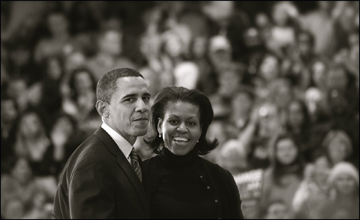The New Yorker Cartoon
The New Yorker Cartoon
Nicolaus Mills on the New Yorker Cartoon
Just when we thought the age of political correctness was over, we are forced to concede that the reports of its death were greatly exaggerated. Nothing illustrates this state of affairs more than the controversy aroused by the New Yorker’s July 21 cover.
The cover, which is by Barry Blitt, is a satire on the idea that Barack Obama and his wife are secret Muslims in league with terrorists and have a deep hatred of America. The Obamas are shown standing in the Oval Office of the White House. He is in Arab garb, complete with sandals and turban. She is dressed like a sixties radical. Her hair is done up in a huge Angela Davis-style Afro, and she is wearing camouflage pants, combat boots, and has an AK-47 slung over her shoulder along with a bandoleer of bullets. The two are exchanging triumphant fist bumps beneath a picture of Osama bin Laden; an American flag burns in the fireplace.
 The title of the cover, “The Politics of Fear,” gives away the cover’s intentions, just as a serious profile of Obama in the magazine reflects the New Yorker’s well-known, liberal politics. But neither Blitt’s title, nor the content of the July 21 New Yorker, nor the cover itself, in which distortion is piled upon distortion, have been enough to satisfy the New Yorker’s critics.
The title of the cover, “The Politics of Fear,” gives away the cover’s intentions, just as a serious profile of Obama in the magazine reflects the New Yorker’s well-known, liberal politics. But neither Blitt’s title, nor the content of the July 21 New Yorker, nor the cover itself, in which distortion is piled upon distortion, have been enough to satisfy the New Yorker’s critics.
“The cartoon is intended to make fun of conservatives as ignorant racists, and essentially marginalize any criticism of Obama as moronic,” the American Spectator complained. Still more common is the complaint by media critics who insist, “I understand it, but, of course, they (the great unwashed who are not New Yorker readers) don’t.” But the most serious complaint about the New Yorker cover came on the Sunday following its publication in a long essay, “We’re Not Laughing at You, or With You,” in the New York Times by Lee Siegel.
At the core of Siegel’s criticism is the charge that the New Yorker did not make its intentions sufficiently clear. The magazine reproduced, rather than satirized, the attacks on Obama, Siegel argues. “But if that very same New Yorker cover had been drawn in a balloon over the head of a deranged citizen—it would have appeared as plausible only in the mind of that person,” Siegel then goes on to explain.
What follows is an implicit plea for political correctness and a return to a time when the only acceptable position on such controversial subjects as racism and sexism was one dominated by liberal piety. Siegel, who in 2006 made headlines when under an alias he wrote flattering comments about his own New Republic blog, contrasts Blitt’s satire with that of Honoré Daumier and George Grosz, whom he thinks were always understandable in their caricatures.
But a more instructive comparison for us is Jonathan Swift’s 1729 essay, “A Modest Proposal,” which Siegel also mentions. In “A Modest Proposal,” Swift, horrified at the impoverishment of Ireland by England, suggests that the solution for the Irish is to eat their own babies. They would then, he points out, be spared the expense of taking care of them in later life, and they would be handsomely rewarded following their birth. Swift proceeds to tell his readers that he has been assured by a knowing American friend that a year-old baby is a nourishing and wholesome food and that he personally has no doubt that a baby could be served equally well in a fricassee or a ragout.
The result is satire that makes a reader wince as much as laugh, but if Siegel and the New Yorker’s critics are to be taken seriously, Swift ought to have come clean for his eighteenth-century audience. At the very least, he should have told them that he had no cannibal tendencies of his own and that his American authority on baby-eating was an invention.
Fortunately Swift never compromised the writing of “A Modest Proposal.” He realized, as we also should, that for satire to be taken seriously, it needs to shock us rather than merely amuse. We need to see that its exaggerations have a basis—a situation that is all too sadly the case with Barack Obama, who, according to a recent Newsweek poll, has 26 percent of the country thinking he was raised a Muslim, 39 percent that he attended an Islamic school, and 12 percent that he was sworn into the Senate on a Quran.
Nicolaus Mills, a professor of American Studies at Sarah Lawrence College, is author of Winning the Peace: The Marshall Plan and America’s Coming of Age as a Superpower. Photo: The Obamas in January 2008. (Luke Vargas / Creative Commons)






